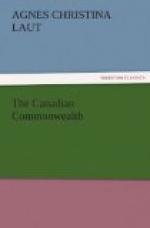Now Canada has one very bad British characteristic. She has the John Bull trick of drawing herself up to every new proposal with an air of “What is that to us?” At this time Canada herself was in bad way. She had just completed her first big transcontinental. Times were dull. The Crown Colony of Newfoundland did not come begging admission to confederation. No political party could do that and live; for politics in Newfoundland are a fanatical religion. I have heard the warden of the penitentiary say that if it were not for politics he would never have any inmates. It is a fact that out-port prisons have been closed for lack of inmates, but long as elections recur, come broken heads. So the Crown Colony did not seek admission. It came feeling the Ottawa pulse, and the Ottawa pulse was slow and cold. “What’s Newfoundland to us?” said Canada. One of the commissioners told me the real hitch was the terms on which the Dominion should assume the Crown Colony’s small public debt; so the chance passed unseized. Newfoundland set herself to do what Canada had done, when the United States refused reciprocity. She built national railways. She launched a system of national ships. She nearly bankrupted her public treasury with public works and ultimately handed her transportation system over to semi-private management. Outside interests began buying the pulp-wood areas. Pulp became one of the great industries. The mines of the east shore picked up. There was a boom in whaling. World conditions in trade improved. By the time that the Dominion had awakened to the value of Newfoundland no party in Newfoundland would have dared to mention confederation, and that is the status to-day. One can hardly imagine this status continuing long. The present war, or the lessons of the present war, may awaken both sides to the advantages of union. Sooner or later, for her own sake solely, Canada must have Newfoundland; and it is up to Canada to offer terms to win the most ancient of British colonies in America. British settlement in Newfoundland dates a century prior to settlement in Acadia and Virginia. Devon men came to fish before the British government had set up any proprietary claim.
II
And now eliminate the details of Canada’s status among the nations and consider only the salient undisputed facts:
Her population has come to her along four main lines of motive; seeking to realize religious ideals; seeking to realize political ideals; seeking the free adventurous life of the hunter; seeking—in modern day—freehold of land. One main current runs through all these motives—religious freedom, political freedom, outdoor vocations in freedom, and freehold of land. This is a good flavor for the ingredients of nationality.
Conditioning these movements of population have been Canada’s climate, her backwoods and prairie and frontier hardship—challenging the weakling, strengthening the strong. No country affords more opportunity to the fit man and none is crueler to the unfit than Canada. I like this fact that Canada is hard at first. It is the flaming sword guarding the Paradise of effort from the vices of inert softened races. Diamonds are hard. Charcoals are soft, though both are the very same thing.




